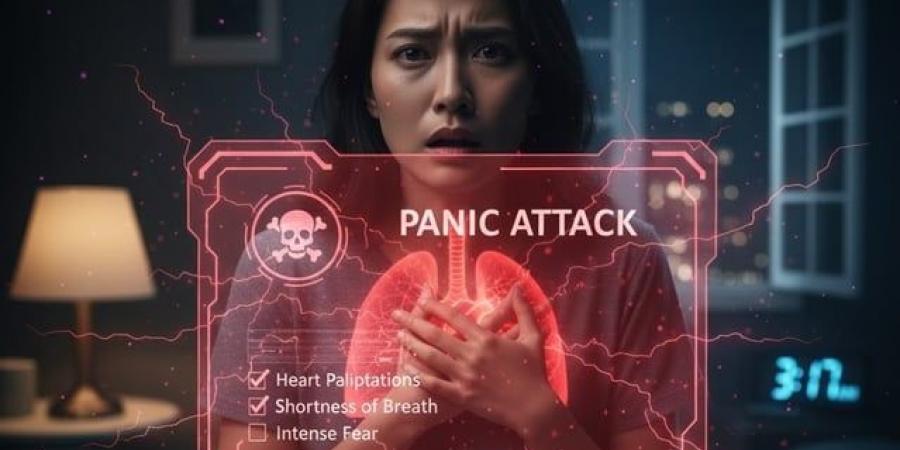نعرض لكم زوارنا أهم وأحدث الأخبار فى المقال الاتي:
5 Important Tips to Relieve Panic Attack Symptoms - المصدر 24, اليوم الاثنين 17 نوفمبر 2025 10:55 صباحاً
المصدر 24 - A panic attack can strike suddenly — your heart races, your chest tightens, your breathing becomes shallow, and a wave of fear floods your body as if something terrible is about to happen.
Even though panic attacks are not physically dangerous, they feel terrifying. The good news is that there are effective, scientifically supported techniques that can help you calm your body, regain control, and reduce symptoms quickly.
Whether you’ve had just one panic attack or experience them often, these five essential strategies can help you manage the moment and prevent symptoms from escalating.
1. Control Your Breathing — Slow, Deep Breaths Reset Your Nervous System
When a panic attack begins, breathing becomes rapid and shallow. This signals your brain that you’re in danger, which makes symptoms worse.
The fastest way to interrupt a panic cycle is to consciously slow your breathing.
Try this method: 4-4-6 breathing
Inhale for 4 seconds
Hold your breath for 4 seconds
Exhale slowly for 6 seconds
Repeat for 1–2 minutes.
Why this works:
Activates the parasympathetic nervous system
Slows down your heart rate
Reduces dizziness
Decreases chest tightness
Sends a “calm signal” to your brain
Avoid:
Breathing too fast
Trying to “catch your breath” forcefully
Closing your throat during breathing
Deep breathing is one of the most effective tools for immediate relief.
2. Ground Yourself in the Present Using the 5–4–3–2–1 Method
Panic attacks often feel like your mind is spinning out of control. Grounding techniques help return your focus to the present moment, steering your thoughts away from fear and physical distress.
Do this grounding exercise:
Identify:
5 things you can see
4 things you can touch
3 things you can hear
2 things you can smell
1 thing you can taste
Why it helps:
Interrupts racing thoughts
Forces your brain to focus on something real
Reduces feelings of dissociation
Helps your body relax
Your senses pull you out of fear and bring you back into the moment, giving your body time to calm down.
3. Relax Your Body Muscles — Tension Makes Symptoms Worse
During a panic attack, the body becomes extremely tense.
Muscle tension sends signals to the brain that something is wrong, making the panic worse.
Releasing tension helps break this cycle.
Try progressive muscle relaxation:
Start with your feet
Tighten the muscles for 3 seconds
Release completely
Move upward through your legs, stomach, shoulders, neck, and face
Benefits:
Reduces overall stress
Relieves chest tightness
Lowers adrenaline levels
Helps regain physical control
Your body cannot stay tense and relaxed at the same time — relaxing your muscles naturally reduces panic symptoms.
4. Remind Yourself: “This Is a Panic Attack — Not a Danger”
One of the most frightening parts of a panic attack is the feeling that something terrible is happening — like a heart attack, fainting, or losing control.
Repeating the truth helps override fear.
Tell yourself:
“This is temporary.”
“My body is overreacting, but I am safe.”
“Panic attacks always pass.”
“I’ve survived this before.”
Why this matters:
The fear of the panic attack itself can intensify the symptoms.
By reminding yourself that you’re not in real danger, you reduce the psychological fuel feeding the attack.
Helpful tip:
Imagine the panic wave rising and falling — you don’t need to fight it, only wait for it to pass.
5. Change Your Physical Environment to Break the Panic Loop
Sometimes simply changing your surroundings can help interrupt a panic attack.
Try any of the following:
Step outside for fresh air
Open a window
Walk slowly around the room
Sit somewhere cooler or quieter
Splash cold water on your face
Why this works:
Moving your body reduces adrenaline
Fresh air helps your breathing improve
A cool environment lowers your heart rate
Physical change disrupts the fear pattern in your brain
Even small environmental shifts can have a strong calming effect.
???? Bonus: What to Do After a Panic Attack
Once the panic has passed, your body might feel:
Tired
Emotional
Shaky
Mentally drained
To recover fully:
Drink water
Sit somewhere comfortable
Avoid caffeine
Do light stretching
Talk to someone you trust
Write down what triggered the attack
Understanding your triggers helps prevent future episodes.






0 تعليق